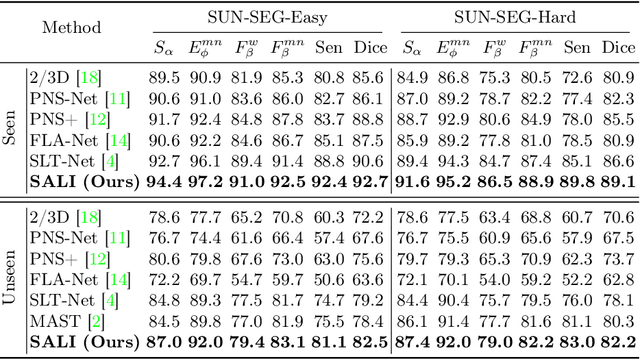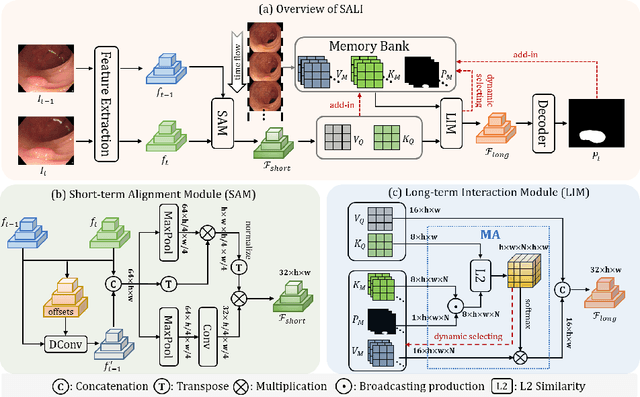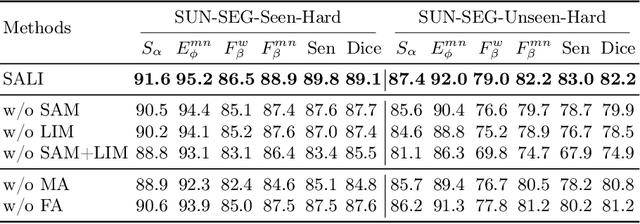Zhenyu Yi
SALI: Short-term Alignment and Long-term Interaction Network for Colonoscopy Video Polyp Segmentation
Jun 19, 2024



Abstract:Colonoscopy videos provide richer information in polyp segmentation for rectal cancer diagnosis. However, the endoscope's fast moving and close-up observing make the current methods suffer from large spatial incoherence and continuous low-quality frames, and thus yield limited segmentation accuracy. In this context, we focus on robust video polyp segmentation by enhancing the adjacent feature consistency and rebuilding the reliable polyp representation. To achieve this goal, we in this paper propose SALI network, a hybrid of Short-term Alignment Module (SAM) and Long-term Interaction Module (LIM). The SAM learns spatial-aligned features of adjacent frames via deformable convolution and further harmonizes them to capture more stable short-term polyp representation. In case of low-quality frames, the LIM stores the historical polyp representations as a long-term memory bank, and explores the retrospective relations to interactively rebuild more reliable polyp features for the current segmentation. Combing SAM and LIM, the SALI network of video segmentation shows a great robustness to the spatial variations and low-visual cues. Benchmark on the large-scale SUNSEG verifies the superiority of SALI over the current state-of-the-arts by improving Dice by 2.1%, 2.5%, 4.1% and 1.9%, for the four test sub-sets, respectively. Codes are at https://github.com/Scatteredrain/SALI.
MonoBox: Tightness-free Box-supervised Polyp Segmentation using Monotonicity Constraint
Apr 02, 2024



Abstract:We propose MonoBox, an innovative box-supervised segmentation method constrained by monotonicity to liberate its training from the user-unfriendly box-tightness assumption. In contrast to conventional box-supervised segmentation, where the box edges must precisely touch the target boundaries, MonoBox leverages imprecisely-annotated boxes to achieve robust pixel-wise segmentation. The 'linchpin' is that, within the noisy zones around box edges, MonoBox discards the traditional misguiding multiple-instance learning loss, and instead optimizes a carefully-designed objective, termed monotonicity constraint. Along directions transitioning from the foreground to background, this new constraint steers responses to adhere to a trend of monotonically decreasing values. Consequently, the originally unreliable learning within the noisy zones is transformed into a correct and effective monotonicity optimization. Moreover, an adaptive label correction is introduced, enabling MonoBox to enhance the tightness of box annotations using predicted masks from the previous epoch and dynamically shrink the noisy zones as training progresses. We verify MonoBox in the box-supervised segmentation task of polyps, where satisfying box-tightness is challenging due to the vague boundaries between the polyp and normal tissues. Experiments on both public synthetic and in-house real noisy datasets demonstrate that MonoBox exceeds other anti-noise state-of-the-arts by improving Dice by at least 5.5% and 3.3%, respectively. Codes are at https://github.com/Huster-Hq/MonoBox.
 Add to Chrome
Add to Chrome Add to Firefox
Add to Firefox Add to Edge
Add to Edge